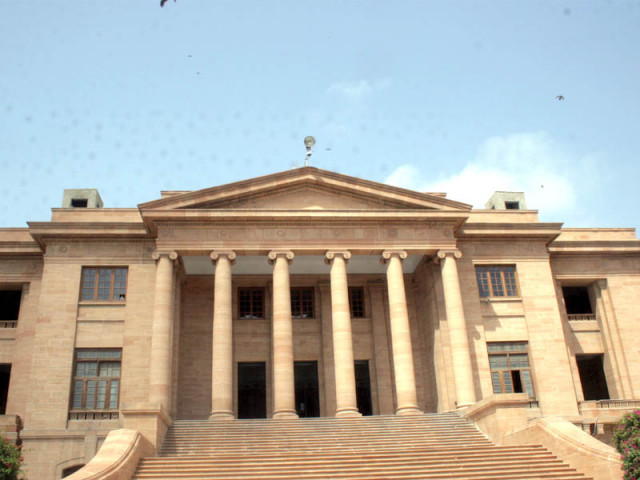SHC issues notices on supply of substandard drugs to CHK
Also issues notices, on overflowing gutters, use of contaminated water for vegetable cultivation

Sindh High Court : PHOTO: EXPRESS
A two-member bench, comprising Justice Muhammad Ali Mazhar and Justice Yousuf Ali Sayeed, issued the notices, in addition to summoning the health department secretary.
The petitioner claimed that CHK had ordered 95,000 bottles of Cefixime, a life-saving drug, from a pharmaceutical company, Baxter. The company, however, supplied substandard medicines, which soon hardened into "cakes from powder," and couldn't be used, he said, also informing the court that CHK MS and an inspector from the Drug Regulatory Authority had written letters to the pharmaceutical company complaining about the substandard drugs. But the issue was swept under the carpet after Baxter made an attractive offer, he added.
He maintained that the supply and use of substandard drugs put patients' lives at risk and moved the court to order the termination of the supply of substandard drugs besides taking action against those found to be involved in it.
The court remarked that people continue fall victim to such malpractices but no one questioned the ones responsible. It sought a detailed report on the issue from the chief secretary and issued notices to other relevant departments and persons.
Overflowing gutters, open nullahs
Another two-member bench, comprising Justice Syed Hasan Azhar Rizvi and Justice Zulfiqar Ali Khan, issued notices to the Sindh government, Karachi Water and Sewerage Board (KWSB) managing director (MD), Karachi Metropolitan Corporation (KMC) municipal commissioner and Sindh advocate-general on Tuesday, seeking their replies on a plea complaining of overflowing gutters and open nullahs in the city.
At the hearing, the petitioner, Mehmood Akhtar Naqvi, informed the court that overflowing gutters and open nullahs posed a threat to citizens' lives.
"You haven't specified the areas [where the problem is being faced]?" observed Justice Rizvi in response to Naqvi's statement.
The petitioner replied that he would have given the names of specific areas had the problem been limited to a few places, adding that a gutter was overflowing even outside the high court building. He maintained that Article 148 of the Constitution dictated that local government bodies be authorised to deal with the problem but they have not been given the authority.
Concluding the hearing, the court issued notices to the Sindh government, KWSB MD, KMC municipal commissioner and Sindh advocate-general, seeking their replies on the plea.
The plea states that dilapidated roads, overflowing gutters and open nullahs put citizen's life at risk. They have turned out to be "maut ke kuaay" [wells of death], and recently, a four-year-old girl, Laiba, died after falling into a nullah near Valika Chowrangi, the plea mentions. It contends that relevant authorities in the city have failed to solve the problem, which is being neglected amid political rivalries and interests, adding that garbage piles, dirt and broken roads have mired down the city.
Stating that the situation is getting worse by each passing day, the plea moves the court to take action against negligent officials, putting an end to people dying after falling into open nullahs.
Sewage water for vegetable cultivation
Meanwhile, the bench comprising Justice Mazhar and Justice Sayeed issued notices to the Sindh government, provincial chief secretary, Karachi commissioner and all six deputy commissioners of the city on a plea pertaining to the use of sewage water for cultivating vegetables in Karachi.
The plea, also filed by Naqvi, claims that contaminated water is being used for cultivating vegetables in Surjani Town, Malir, Landhi and other areas of the city. This has led to an increase in the incidence of various diseases, while relevant authorities have seemingly turned a blind eye to the problem, it states.
Basing his arguments on this ground, Naqvi prayed the court to put an end to the use of contaminated water and industrial waste for cultivating vegetables.
"Sewage water is being used for growing vegetables," Justice Mazhar remarked in response to Naqvi's plea and asked, "What is being fed to the citizens?"
The court issued notices to the Sindh government, provincial chief secretary, Karachi commissioner and all six deputy commissioners of the city and directed the relevant authorities to submit a detailed report on the issue at the next hearing on February 25.
Published in The Express Tribune, February 5th, 2020.



















COMMENTS
Comments are moderated and generally will be posted if they are on-topic and not abusive.
For more information, please see our Comments FAQ